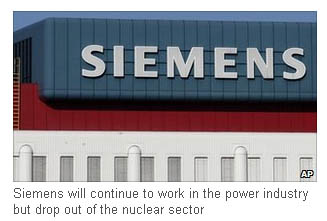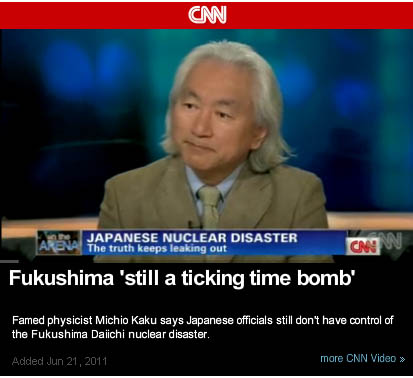Archive for the ‘Fukushima’ Category
Siemens to quit nuclear industry
September 18, 2011

German industrial and engineering conglomerate Siemens is to withdraw entirely from the nuclear industry.
The move is a response to the Fukushima nuclear disaster in Japan in March, chief executive Peter Loescher said.
He told Spiegel magazine it was the firm’s answer to "the clear positioning of German society and politics for a pullout from nuclear energy".
"The chapter for us is closed," he said, announcing that the firm will no longer build nuclear power stations.
A long-planned joint venture with Russian nuclear firm Rosatom will also be cancelled, although Mr Loescher said he would still seek to work with their partner "in other fields".
Siemens was responsible for building all 17 of Germany’s existing nuclear power plants.
But more recently, the firm has limited itself to providing the non-nuclear parts of plants being built by other firms, including current projects in China and Finland.
The latest decision appears to imply a step back from building "conventional islands" – the non-nuclear plant in nuclear power stations – an area in which Siemens has remained active.
However, Mr Loescher also said Siemens would continue to make components, such as steam turbines, that are used in the conventional power industry, but can also be used in nuclear plants.
U-turn
He also gave his backing to the German government’s planned switch to renewable energy sources, calling it a "project of the century" and claiming Berlin’s target of reaching 35% renewable energy by 2020 was achievable.
The German chancellor, Angela Merkel, announced at the end of May that all of the country’s 17 nuclear reactors would be shut down by 2022.
Before the Fukushima disaster, nuclear power accounted for 23% of electricity production in Germany.
The German government’s decision marked a complete U-turn by the chancellor, who only in September 2010 had announced that the life of existing nuclear plants would be extended by an average of 12 years.
Siemen’s move, announced on Sunday, is also a turnaround.
In 2009, the firm withdrew from an eight-year-old nuclear joint venture with French energy firm Areva, shortly before announcing its new deal with Rosatom.
"In view of global climate change and the increasing power demand worldwide, for us nuclear energy remains an essential part of a sustainable energy mix," Mr Loescher had said at the time.
This document contains copyrighted material whose use has not been specifically authorized by the copyright owner. SEED Coalition is making this article available in our efforts to advance understanding of ecological sustainability, human rights, economic democracy and social justice issues. We believe that this constitutes a "fair use" of the copyrighted material as provided for in section 107 of the US Copyright Law. If you wish to use this copyrighted material for purposes of your own that go beyond "fair use", you must obtain permission from the copyright owner.
Germany’s Siemens renounces nuclear activity
Sep 18, 2011
(AFP)
BERLIN — German industrial giant Siemens is turning the page on nuclear energy in line with Berlin’s decision to agree to an end to atomic power, the group’s CEO Peter Loescher said Sunday.
"We will no longer be involved in overall managing of building or financing nuclear plants. This chapter is closed for us," he told the Der Spiegel weekly in an interview published on Sunday.
"We will from now on supply only conventional equipment such as steam turbines," he said. "This means we are restricting ourselves to technologies that are not only for nuclear purposes but can also be used in gas or coal plants."
There has been massive debate in Germany on the safety of nuclear energy after the March 11 earthquake and tsunami which knocked out cooling systems at Japan’s Fukushima Daiichi plant, causing reactors to overheat and radiation to leak.
Germany switched off several of its reactors in the wake of the disaster and has since passed legislation to phase out nuclear energy by 2022.
In the interview, Loescher also definitively buried a long-planned joint venture project with Russian group Rosatom in the nuclear sector.
The partnership was announced in March 2009, shortly after Siemens ended a deal with France’s Areva.
"The two groups are still very interested in a partnership but it will be in another field," he said.
Loescher said his group’s decision to withdraw from the nuclear industry reflected "the very clear stance taken by Germany’s society and political leadership."
"That changed things for us at Siemens," he said.
Germany is the first major industrialised power to agree an end to atomic power since the disaster, the world’s worst since Chernobyl in 1986, with tens of thousands of people living near Fukushima evacuated.
Germany wants to boost the share of the country’s power needs generated by renewable energies to 35 percent by 2020 from 17 percent at present.
Siemens, which produces gas turbines and equipment used to produce solar and wind power, wants to develop a pioneering role in "green" energy.
Elsewhere is Europe, a recent vote against Italian premier Silvio Berlusconi’s plans to resume the country’s nuclear programme was seen as a reflection of popular unease about atomic energy after Fukushima.
The Swiss government in May, too, recommended that nuclear plants be phased out.
The new chief of the Paris-based International Energy Agency Maria van der Hoeven said earlier this month that nuclear power will have a place in the future however.
Van der Hoeven, formerly the Dutch minister for economic affairs, said: "There will be room for nuclear energy in the future.
"I think if we really want to go — and we do — towards a future where we have less CO2 emissions, there are only two real things to get there, and it has to do with nuclear, because it doesn’t produce CO2, and it has to do with renewables.
Copyright © 2012 AFP. All rights reserved.
This document contains copyrighted material whose use has not been specifically authorized by the copyright owner. SEED Coalition is making this article available in our efforts to advance understanding of ecological sustainability, human rights, economic democracy and social justice issues. We believe that this constitutes a "fair use" of the copyrighted material as provided for in section 107 of the US Copyright Law. If you wish to use this copyrighted material for purposes of your own that go beyond "fair use", you must obtain permission from the copyright owner.
Fukushima Nuclear Plant Remains ‘Ticking Time Bomb’ After Japan Disaster: Michio Kaku, Theoretical Physicist
6/22/11
Huffington Post
Though global fears about radiation emissions from the heavily damaged Fukushima Daiichi nuclear power facility have calmed in the weeks since Japan’s devastating March 11 earthquake and tsunami, famed physicist Michio Kaku insists the situation remains a "ticking time bomb."
A professor of theoretical physics at the City University of New York and the City College of New York, Kaku discussed some recent revelations about the disaster’s impact, and noted that Japanese officials still don’t have control at the site. "In the last two weeks, everything we knew about that accident has been turned upside down," Kaku says. "Now we know it was 100 percent core melt in all three reactors…now we know it was comparable to the radiation at Chernobyl."
Among Kaku’s other distressing notes: Fukushima workers are exposed to a year’s dose of radiation within minutes of entering the site, and cleanup will take between 50 to 100 years. "It’s like hanging by your fingernails," he says. "It’s stable, but you’re hanging by your fingernails."
Watch Kaku’s interview with CNN here:
This document contains copyrighted material whose use has not been specifically authorized by the copyright owner. SEED Coalition is making this article available in our efforts to advance understanding of ecological sustainability, human rights, economic democracy and social justice issues. We believe that this constitutes a "fair use" of the copyrighted material as provided for in section 107 of the US Copyright Law. If you wish to use this copyrighted material for purposes of your own that go beyond "fair use", you must obtain permission from the copyright owner.



